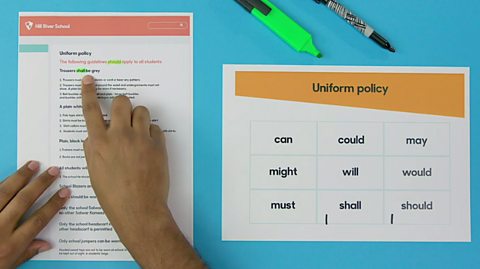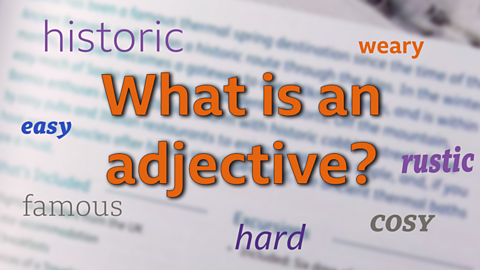Why do we need to link ideas in a sentence?
So that a reader can follow your thinking and understand how ideas relate to each other.
Introduction
When writing, it is often necessary to link ideas together. Conjunctions are linking words, such as 'and', 'because', 'then', 'however', that help your reader follow your train of thought, or see the connection or relationship between ideas and arguments.
Conjunctions can also add clarity to your writing, especially an argument or essay. They can help you write longer sentences without sounding awkward. Your writing will benefit from using a variety of conjunctions, as well as using the common conjunctions of 'and' 'then' or 'because'.
There are several types of conjunctions, including coordinating conjunctionsConnecting words that bring words, ideas or clauses together. They are placed between the words and phrases they are linking (for, and, nor, but, or, yet, so). and subordinating conjunctionsLink two clauses together, a main clause and a subordinate clause. as well as conjunctive adverbsWords that join independent clauses into one sentence and show how two ideas connect..
Video about using coordinating conjunctions
Learn how to link ideas in sentences by using coordinating conjunctions
Coordinating conjunctions
Coordinating conjunctions connect words, phrases and clauses. Clauses are the building blocks of a sentence and conjunctions can help link them together. Coordinating conjunctions are placed between the words and phrases they are linking, not at the start or end of a sentence.
There are seven coordinating conjunctions. The phrase FAN BOYS can be used to remember them:

These conjunctions often link equal parts of the whole sentence and bring ideas together:
- ‘Many people are trying to cut down on their plastic use, so they carry reusable shopping bags.’
- ‘Plastic in the ocean is causing damage to animals, and litter is destroying their habitat.’
The conjunctions 'so' and 'and' in the examples above link the ideas together and make the connection clear to the reader.
Place the FAN BOYS
Conjunctive adverbs
Conjunctive adverbs can also be used to link ideas in your writing. They are used in a similar way to coordinating conjunctions. These are some examples:
- however
- also
- therefore
- meanwhile
- nevertheless
Unlike coordinating conjunctions, conjunctive adverbs can be placed anywhere in a sentence:
- ‘Sam trained hard for his race; however, he didn’t achieve a personal best.’
- ‘Sam trained hard for his race; he didn’t achieve a personal best, however.’
Notice that a semicolon is usually required to separate clauses when using conjunctive adverbs within a sentence.
Find the odd one out
Which sentence uses a conjunctive adverb incorrectly?
I went to see a horror movie; however, I did not feel scared.
I went to see a horror movie; I did not feel scared, however.
However I went to see a horror movie, I did not feel scared.
"However I went to see a horror movie, I did not feel scared" is incorrect.
Why? The sentence no longer makes sense. 'However' is no longer linking two ideas.

Subordinating conjunctions
Subordinating conjunctions link two clauses together, a main clause and a subordinate clause, and help to show the relationship between the clauses.
The relationship between them could be related to the order in which something happens, expressed using a subordinating conjunction such as when, before or after.
For example, ‘Before completing the assignment, students should undertake the reading.’
Here ‘students should undertake the reading’ is the main, or independent, clause. ‘Before completing the assignment’ tells us when they should do it.
They can also indicate a cause and effect relationship - when something happens because something else has happened.
For example, ‘Her hands were cold because she had forgotten her gloves.’
The cold hands have been caused by the lack of gloves - the effect of no gloves are cold hands. These conjunctions are very useful when structuring an argument, in order to show a cause and effect relationship.
Some more subordinating conjunctions used to indicate cause and effect are:
- consequently
- therefore
Subordinating conjunctions tend to add more information to the main part of the sentence. Clauses that start with a subordinating conjunction can also be moved to the start of the sentence, unlike coordinating conjunctions:
- ‘Although she was tired, she kept running.’
- ‘She kept running, although she was tired.’
Find the missing subordinating conjunction
Which sentence does not use a subordinating conjunction?
- I feel happier and so do most of my friends in the sunshine.
- Although it is a beautiful day outside, I’m going to stay inside and play video games.
- I prefer to go inside when it is hot.
- I feel better because I am outside in the fresh air.
- 'and' is a coordinating conjunction not a subordinating one. It links two equal ideas.

Comparing and contrasting conjunctions
Comparing and contrasting conjunctions link ideas that are similar or different:
- equally
- similarly
- likewise
- in comparison
- whereas
- in contrast
- alternatively
- otherwise
These conjunctions are very important if you are writing a direct comparison of two or more things:
Many African countries have banned plastic bags; in contrast America does not have a nationwide ban.
Many of these conjunctions can be used to structure an overall argument, as well as link ideas within sentences. Experiment with using different types of conjunctions and see the effect they can have on your writing.
Which sentence does not use a comparing or contrasting conjunction?
- Travelling to school by car creates pollution whereas walking does not.
- Turn off the tap when you’re brushing your teeth because it saves water.
- Carrying reusable bags is a great way to reduce using plastic; similarly a reusable water bottle reduces the number of single-use plastic bottles we buy and then throw away.
Answer: 2. 'because' is a coordinating conjunction. Turning off the tap results in water being saved. The two parts of the sentence do not compare or contrast.

Test your knowledge
GCSE exam dates 2025
Find out everything you need to know about the 2025 GCSE exams including dates, timetables and changes to exams to get your revision in shape.

More on Grammar
Find out more by working through a topic
- count6 of 12

- count7 of 12

- count8 of 12

- count9 of 12
